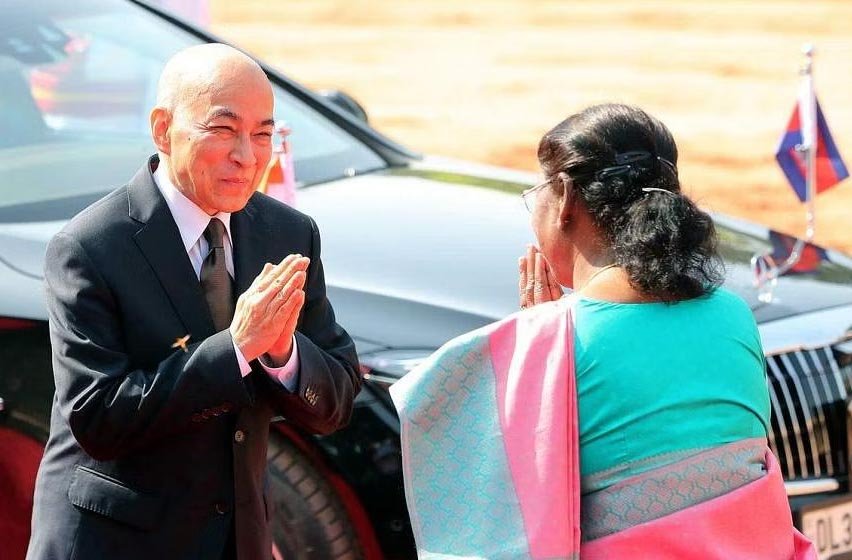June 1, 2023
NEW DELHI – India wants to “elevate” defence ties and push trade with Cambodia, said Indian President Droupadi Murmu during a visit by Cambodian King Norodom Sihamoni this week.
It was the first visit by a monarch from the South-east Asian kingdom in over six decades.
Ms Murmu, who hosted a banquet for the King on Tuesday evening at Rashtrapati Bhavan, the President’s official residence, said India is keen to increase defence ties and noted “there is great potential for further growth in trade and investment between India and Cambodia”, according to a government statement.
The last visit by a Cambodian king was in 1963 when the current king’s late father, King Norodom Sihanouk, was in India.
Indian Prime Minister Narendra Modi, who met King Sihamoni on Tuesday, hoped for “a new chapter” in India-Cambodia ties.
“Our nations share deep historical and cultural ties, and we look forward to strengthening our friendship and cooperation even further. May his visit mark a new chapter in India-Cambodia relations,” tweeted Mr Modi.
The three-day visit, which ended on Wednesday, also marks the end of celebrations marking 70 years of diplomatic ties between the two countries.
Analysts said the King’s visit was symbolic, but also signified the growing momentum in ties.
India’s ties with Cambodia have expanded at a slower pace than those with other Asean countries, with bilateral trade of only US$320 million (S$434 million) in 2021-2022, among the lowest in India’s trade with countries in the bloc.
India’s trade for the same period with Singapore – the South Asian nation’s largest trading partner within Asean – was US$30.11 billion, according to Indian government figures.
Over more than a decade, India has extended US$100 million in loans to Cambodia for development projects, including in infrastructure. In the 1990s, it also helped with funds and expertise to restore Angkor Wat, the most famous temple in Cambodia. It is currently helping with restoration work at Ta Prohm Temple and Preah Vihear Temple, a world heritage site.
But of late, there has been greater momentum in ties, with the King’s visit preceded by the February visit of General Hun Manet, the first by a Cambodian military commander.
Cambodia is keen to ramp up ties with India, noted Professor Harsh V. Pant, vice-president of studies and foreign policy at the Observer Research Foundation, a think-tank in New Delhi.

Indian President Droupadi Murmu (right) hosted a banquet for Cambodian King Norodom Sihamoni at Rashtrapati Bhavan, the President’s official residence, on May 30, 2023. PHOTO: EPA-EFE
“(The visit) is symbolically important but also, it signifies this drive among South-east Asian countries towards diversification and towards expanding their partnerships with countries beyond their traditional neighbours,” said Prof Pant.
India, for its part, “would certainly like to develop newer synergies with Cambodia and develop a relationship that is more robust”, he added.
He noted, too, that India is increasingly being looked upon as a country with the capabilities, “as well as a certain willingness”, to play a larger regional and global role. “This means that a lot of South-east (Asian) countries like Cambodia are interested in India,” he said.
This is as China is facing negative headwinds in its economy and countries in South-east Asia are looking to life beyond the Asian economic powerhouse, an important trading partner for them, he added. In this regard, “India as a partner certainly has an important role” in the region, said Prof Pant.
Apart from trade ties, defence ties with Cambodia, which traditionally has centred on capacity building for the Cambodian armed forces, look set to expand.
During General Hun Manet’s visit, the two countries signed agreements for cooperation between their armies and opened direct communication between their military units.
The armies of the two countries subsequently held their first talks in April, where they discussed increasing training cooperation and the sale of military hardware.
This year, India is looking to train more than 80 Cambodian armed personnel.
The desire to deepen military ties with India comes as Cambodia has been facing questions from the United States over Chinese presence at its Ream Naval Base on the coast of the Gulf of Thailand.
In 2022, The Washington Post reported, quoting Western officials, that China is secretly building a naval facility on the northern portion of the base. Cambodia and China have both denied this.
The deepening US-China rivalry is also pushing South-east Asian countries like Cambodia to focus more on India, said Prof Pant.
“As the US-China contestation becomes sharper, many countries would like to engage or expand the spheres of cooperation with a country like India, just to be away from this contestation and just to ensure their equities are preserved,” he said.
“For both India and countries like Cambodia, it is an important moment to look at the relationship afresh and to build a new foundation for a future that is increasingly volatile and complex.”
Newer areas of cooperation have also emerged this year. In March, Cambodia and India signed an agreement for the reintroduction of tigers to Cambodia, with New Delhi considering sending tigers there.
Professor Prabir De, coordinator of the Asean-India Centre at the Research and Information System for Developing Countries institute, noted: “Cambodia has gained from many Indian projects in recent years… Today, relations between India and Cambodia are in a new promising phase.”


